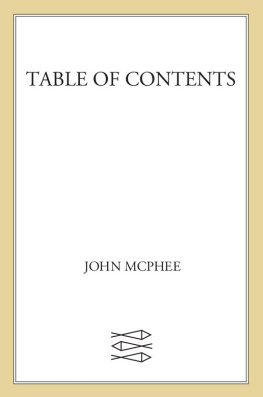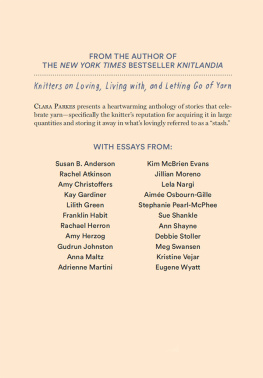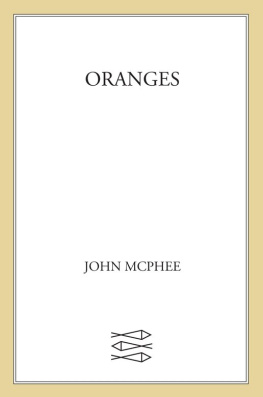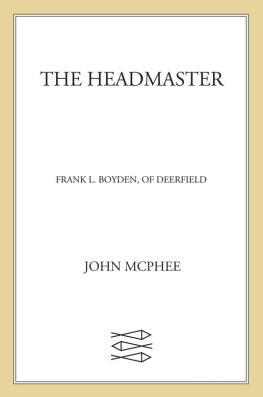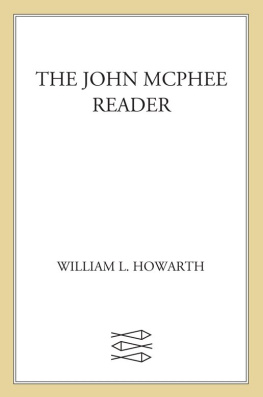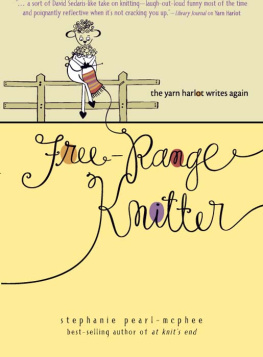Pearl-McPhee - Things I learned from knitting-- whether I wanted to or not
Here you can read online Pearl-McPhee - Things I learned from knitting-- whether I wanted to or not full text of the book (entire story) in english for free. Download pdf and epub, get meaning, cover and reviews about this ebook. City: North Adams;MA, year: 2008, publisher: Storey Publishing, LLC, genre: Home and family. Description of the work, (preface) as well as reviews are available. Best literature library LitArk.com created for fans of good reading and offers a wide selection of genres:
Romance novel
Science fiction
Adventure
Detective
Science
History
Home and family
Prose
Art
Politics
Computer
Non-fiction
Religion
Business
Children
Humor
Choose a favorite category and find really read worthwhile books. Enjoy immersion in the world of imagination, feel the emotions of the characters or learn something new for yourself, make an fascinating discovery.

- Book:Things I learned from knitting-- whether I wanted to or not
- Author:
- Publisher:Storey Publishing, LLC
- Genre:
- Year:2008
- City:North Adams;MA
- Rating:3 / 5
- Favourites:Add to favourites
- Your mark:
- 60
- 1
- 2
- 3
- 4
- 5
Things I learned from knitting-- whether I wanted to or not: summary, description and annotation
We offer to read an annotation, description, summary or preface (depends on what the author of the book "Things I learned from knitting-- whether I wanted to or not" wrote himself). If you haven't found the necessary information about the book — write in the comments, we will try to find it.
Pearl-McPhee: author's other books
Who wrote Things I learned from knitting-- whether I wanted to or not? Find out the surname, the name of the author of the book and a list of all author's works by series.
Things I learned from knitting-- whether I wanted to or not — read online for free the complete book (whole text) full work
Below is the text of the book, divided by pages. System saving the place of the last page read, allows you to conveniently read the book "Things I learned from knitting-- whether I wanted to or not" online for free, without having to search again every time where you left off. Put a bookmark, and you can go to the page where you finished reading at any time.
Font size:
Interval:
Bookmark:
The mission of Storey Publishing is to serve our customers by publishing practical information that encourages personal independence in harmony with the environment.
Edited by Deborah Balmuth
Art direction by Mary Winkelman Velgos
Text production by Jennifer Jepson Smith
Cover design by Mary Winkelman Velgos
Cover illustration by Dan O. Williams
Hand-lettering and interior illustrations by Sarah Wilkins
2008 by Stephanie Pearl-McPhee
All rights reserved. No part of this book may be reproduced without written permission from the publisher, except by a reviewer who may quote brief passages or reproduce illustrations in a review with appropriate credits; nor may any part of this book be reproduced, stored in a retrieval system, or transmitted in any form or by any means electronic, mechanical, photocopying, recording, or other without written permission from the publisher. For additional information, please contact Storey Publishing, 210 MASS MoCA Way, North Adams, MA 01247.
Storey books are available for special premium and promotional uses and for customized editions. For further information, please call 1-800-793-9396.
Printed in the United States by R.R. Donnelley
10 9 8 7 6 5 4 3 2 1
Library of Congress Cataloging-in-Publication Data
Pearl-McPhee, Stephanie.
Things I learned from knitting whether I wanted to or not / Stephanie Pearl-McPhee.
p. cm.
ISBN 978-1-60342-062-4 (hardcover w/ jacket : alk. paper)
1. Knitting. 2. KnittingMiscellanea. 3. Knitters (Persons) Miscellanea. I. Title.
TT820.P3748 2008
746.43'2dc22
2008005462
This book is for my mum,
the clever and formidable (but non-knitting)
Bonnie McPhee.
I love her.
 Despite the way it makes non-knitters look at me like Im a few sheep short of a flock I have often remarked that I think knitting is an excellent metaphor for much of life. Whether we like it or not, becoming knitters changes the way we think, feel, process information, and interact with the world around us. In short, I believe knitters by simply engaging in knitting, learning what it has to teach us, and looking at how we learn it somehow become different from other people.
Despite the way it makes non-knitters look at me like Im a few sheep short of a flock I have often remarked that I think knitting is an excellent metaphor for much of life. Whether we like it or not, becoming knitters changes the way we think, feel, process information, and interact with the world around us. In short, I believe knitters by simply engaging in knitting, learning what it has to teach us, and looking at how we learn it somehow become different from other people.
There is a school of psychology called cognitive psychology that concerns itself with how your brain handles mental processes like language, memory, problem solving, and reasoning. To illustrate the concept, these psychologists imagine your brain a little like its a computer: Information goes in, is somehow stored, is accessed when you need it, and then is reused. People who research this sort of thing are interested in how you filter what you will focus on, the way you use pattern recognition and object recognition, and the way you experience time sensation all those things that influence that computer-like processing. Now, Im no knitting cognitive psychologist, but it struck me right away that if I did happen to be one, I would have instantly recognized these four areas as being all about the knitting.
Attention and filter theories are the ideas surrounding how you focus your mental energy. In a vivid, busy world, this is about how you will sort the hundreds of pieces of information coming at you at once and decide what youll pay attention to, store, recall, and use. In knitting terms, you use this skill when you count out loud to drown out the kids as youre casting on, struggle with choosing one yarn that you love out of the many in the shop, or show the remarkable ability to consistently ignore the instructions for working a gauge swatch that appears at the top of every pattern. It is the skill youre using when you can peacefully set aside everything around you the dog, the kids and the pot burning on the stove while you knit in the living room, interpreting a chart.
Knitters use pattern recognition every time we knit. At a higher level, pattern recognition is whats happening every time you notice that youre decreasing along a center line and dont have to count anymore or when, after five hours of struggling with the instructions for a particular stitch, you finally experience that moment when it comes together and you understand where the whole thing is going. Youre also using pattern recognition every time you make a stitch. The simple act of making one stitch after another is a pattern, and internalizing that pattern is what makes knitting easier over time and lets you know when youve arsed it up.
Object recognition sounds simple, and it is: Its the skill that your brain uses to tell a tree from a face or to recognize your car keys when you need them. Youd have a really hard time getting around without using this skill at its most basic level. In its more complex forms, youre practicing object recognition when you identify garter stitch, even though this time its blue and on a hat instead of last time, when it was green and on a sweater. (Thats way more complicated than it sounds.) Its how you can tell that your decrease is wrong and how your brain knows that your sweater isnt working out. It doesnt look like a sweater.
All of these cognitive theories are interesting, but none as interesting as time sensation. Even if they dont know the name for the concept, people talk about this all the time: the idea that the passage of time can feel different according to what youre doing or what youre experiencing. Its the genesis of the phrase time flies when youre having fun or, to put it in a knitterly context, why the plain black, garter-stitch scarf you loathe seems as if its taking forever while the much bigger sweater made from a yarn you adore moves like lightning. Knitters play with our brains and time sensation all the time, actually using knitting to change how we feel about times passage. I know that I am deliberately altering my sensation of time when Im knitting while waiting for an appointment, and I know that if you dont let me knit while I wait, that time will slow down and Ill just about go raving out of my tree.
If cognitive psychology is about all these things, and about how these things change how you store, retrieve, and use information, then surely, it must be obvious that engaging in knitting has to shape your brain and how it works. All these years Ive maintained that knitters are hooked up a little bit differently than everyone else and maybe I havent been wrong or joking. Considering all this psychology stuff, it has to be true that I was right in the first place, and what we have always suspected is true: By virtue of playing around with all these brain functions on a daily basis, knitters are learning lessons and changing all the time. Knitters are actually becoming different from ordinary people.
When I add all of this up, everything Ive read about the human brain and everything I know that knitting has beaten into my brain over the years, I am left thinking that there are really only two things I could do with the lessons Ive learned from all this wool: I could go back to university, bust myself getting a PhD and become a really kick-ass cognitive psychologist or I could write a book about what knitting has taught me.
I went with the latter and here it is.

Beginning is easy,
continuing is hard.
I THINK ITS A FEELING every knitter knows. I am unclear why it happens, but Ive seen it triggered in myself and others by exposure to new yarn or a perfect pattern or even by watching my knitting friends start something I covet. Occasionally, it happens when Im stash storing or tidying (which we all know can trigger all sorts of maladies caused by a dreadful overdose of wool fumes).
Next pageFont size:
Interval:
Bookmark:
Similar books «Things I learned from knitting-- whether I wanted to or not»
Look at similar books to Things I learned from knitting-- whether I wanted to or not. We have selected literature similar in name and meaning in the hope of providing readers with more options to find new, interesting, not yet read works.
Discussion, reviews of the book Things I learned from knitting-- whether I wanted to or not and just readers' own opinions. Leave your comments, write what you think about the work, its meaning or the main characters. Specify what exactly you liked and what you didn't like, and why you think so.


